Follow Your Different
051 Should I Start a Business?
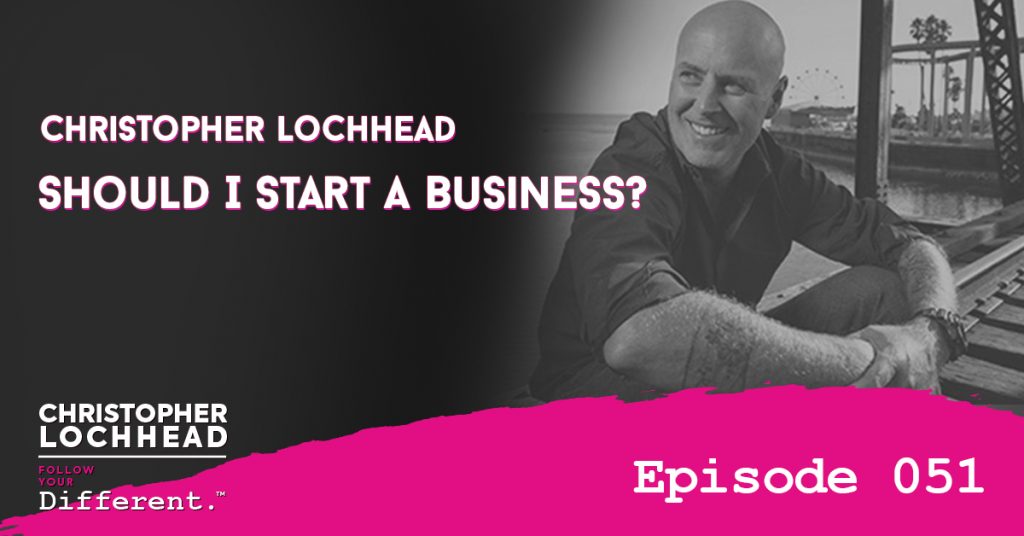
Podcast: Play in new window | Download (Duration: 7:55 — 18.4MB) | Embed
Subscribe: Apple Podcasts | Spotify | Pandora | RSS | More
On today’s special episode, Christopher answers a question from a young woman who wants to know whether she should start a business. He touches on two points: the effect of formal education on entrepreneurial success and the distinction between missionaries and mercenaries.
Entrepreneurship is Not for Everybody
Christopher received an email from a 20-year-old woman thinking about leaving school to starting a business. Perhaps inspired by his own story, she sought out his help.
With very few options after getting thrown out of school at 18, Christopher started a business. Entrepreneurship was a way out of a life of struggle for him. However, even a huge proponent of entrepreneurship like Christopher thinks it is not the answer for everybody.
“It’s an interesting thing that for many entrepreneurs, entrepreneurship is the only root that we have.” – Christopher Lochhead
Education Remains Valid for Most
The first thing that you should ask yourself when you consider quitting school to start a business is whether you are really ready. True, a lot has been said about success after dropping out and how college is slowly dying.
But according to the Kauffman Foundation, adults without formal education are much less likely to be entrepreneurs than their educated counterparts. Research also shows that the more educated you are, the more you are going to make. While the media portrays lots of dropout-turned-rockstar tales, the truth is that most entrepreneurs get some education.
“This is coming from a guy who didn’t go to school. but I think you need to think twice before dropping out because for most people, school pays off.” – Christopher Lochhead
Are You on a Mission?
Another question to ask: are you a missionary or a mercenary? Christopher’s buddy Eddie Yoon makes this very important distinction. If you are the latter, then you are going to tap out when it gets hard.
There will be massive losery along the way and the disappointments will be huge. Things that will make you want to quit will happen on a fairly regular basis. Being mission-driven, like what most top VCs dub successful entrepreneurs, is the way to charge forward.
“Your commitment to the mission is what will get you through the hard parts. And there will be hard parts and the hard parts will be way worse than anybody ever expressed to you.” – Christopher Lochhead
To hear more about Christopher’s take on whether you should start a business, download and listen to the episode. Got a question for Christopher? Email him at bl*******@******ad.com.
Link:
Quora – What would be your advice for a 21-year-old starting a company?
We hope you enjoyed this episode of Follow Your Different™! Christopher loves hearing from his listeners. Feel free to email him, connect on Facebook, Twitter, Instagram and subscribe on iTunes!
050 Can Sales & Marketing Work Together? with Brian Burns
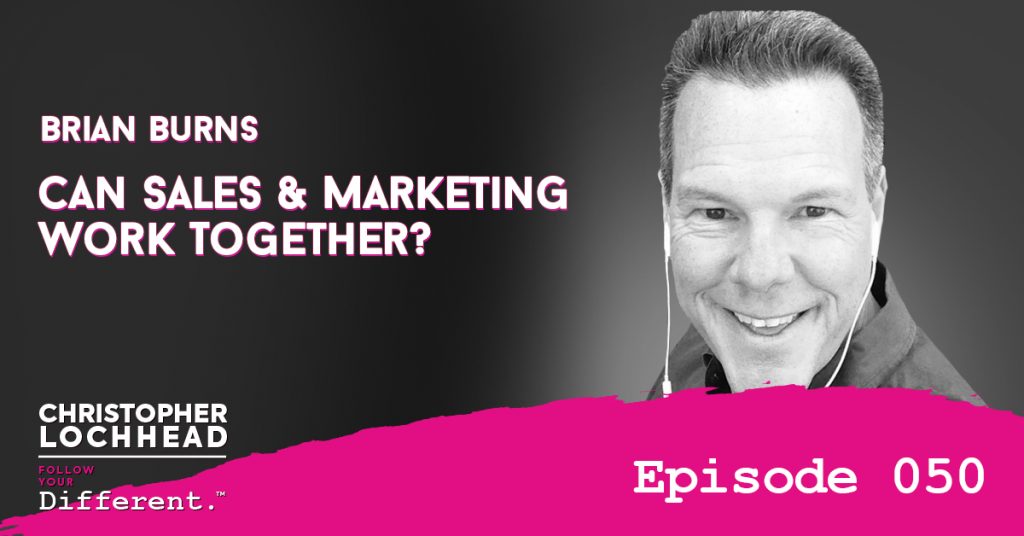
Podcast: Play in new window | Download (Duration: 52:11 — 48.0MB) | Embed
Subscribe: Apple Podcasts | Spotify | Pandora | RSS | More
On this episode, a no BS leader in the sales world, legendary author and podcaster Brian Burns.
Brian and Christopher had a captivating free-range conversation about sales & marketing and they unearth some powerful ideas for how the two can work together and they tackled the always important topic of – sales and marketing alignment.
“Certainly in marketing, we’ve got a lot of shiny objects to play with and what I found working with CMOs is they pick the shiny object who enhance their portfolio versus enhance the company’s position.” – Brian Burns
Sales and Marketing Alignment
Have you ever run into this issue? Lochhead found some easy ways to get it right where sales and marketing were completely in sync.
First is for CMOS to treat the quarterly sales number like it was your 100% responsibility.
“If you’re the head of sales and I’m the head of marketing and we’re working together, it’s not your number, it’s our number. It’s not your company, it’s our company.” – Christopher Lochhead
Breaking the Gap between Sales and Marketing
Being in a field is where you will really learn.
“I think the misalignment of sales and marketing, generally is the fault marketing.” – Christopher Lochhead
To hear more about Brian a no BS leader in the sales world, download and listen to this episode.
Bio:
Brian Burns is the sales guru in Silicon Valley and a host of two podcasts in the top 15 in business on iTunes, The B2B Revenue Leadership show, and The Brutal Truth about Sales and Selling.
He has authored four books on B2B sales and marketing and he has over 25 years of experience.
Links:
We hope you enjoyed Brian Burns on this episode of Follow Your Different™! Christopher loves hearing from his listeners. Feel free to email him, connect on Facebook, Twitter, Instagram and subscribe on iTunes!
049 How to Build a Business that Works for your Life with Ever Gonzalez
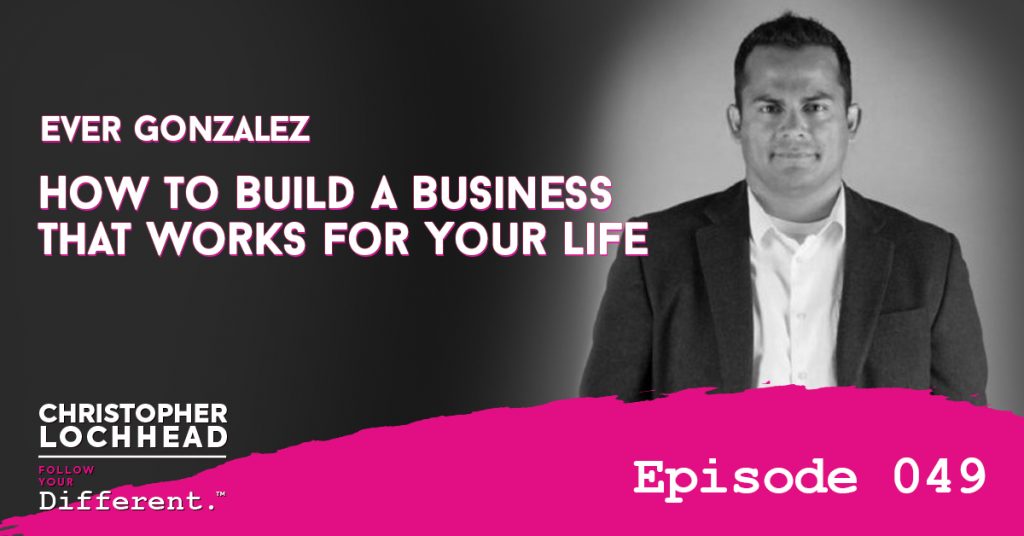
Podcast: Play in new window | Download (Duration: 1:09:26 — 63.8MB) | Embed
Subscribe: Apple Podcasts | Spotify | Pandora | RSS | More
On this episode, we have a podcaster who is loved by entrepreneurs Ever Gonzalez.
Ever and Christopher had a fun and informative conversation about designing business that serves your life, not the other way around, and what he’s learned in talking to over 400 success entrepreneurs on his popular podcast.
“I would much rather take it a little bit easier and have the things that are important to me my family, freedom, time than to hustle, hustle, hustle and have all the money in the world for what reason.” – Ever Gonzalez
Outlier On Air
Ever had an amazing journey in his life, a great career, and he a successful run as an entrepreneur running a freight management company all starting his podcasting in December 2013.
At first, it was strictly for entrepreneurs, but halfway thru it, he became curious with other authors and people that he wanted to know more. He’s enjoyed talking about business and people and now, it has over 422 episodes.
Unpacking Hustle
A lot of people today wants to be famous and they are losing money trying to follow this dream because they were hustling. As we get older, we have to step back, think and slow things down in order to get good results.
Ever said that he’s living a life that he can control, a life that provides him freedom, still makes some money and working on projects that he’s passionate about.
“Hustle is a no shit, Sherlock. You can go back and look at any book, of what anybody who’s ever been successful, it takes hard work.” – Christopher Lochhead
Finding the Right Pace
Most people don’t know how to value time and being in balanced is something that is hard to do especially working in entrepreneurial businesses.
In reality, what we shared with younger entrepreneurs is that there will be plenty of time and they will be less effective, if they burn themselves out.
Remember the point of all of this work is to deign a legendary life, not kill yourself “hustling”
According to Ever, he had seen the ups and downs, but it’s the mental health that scares him.
In a lot of ways, success is about learning to manage you own psyche.
To hear more about Ever a podcaster who is loved by entrepreneurs, download and listen to this episode.
Bio:
Ever Gonzalez is an entrepreneur, CEO, a top podcaster and the Founder of OutlierHQ, a media and events company that provides resources to help entrepreneurs start, grow, and scale their businesses. He is also the host of Outlier On Air, a weekly podcast that interviews Founders, Disrupters, and Mavens.
Links:
We hope you enjoyed Ever Gonzalez on this episode of Follow Your Different™! Christopher loves hearing from his listeners. Feel free to email him, connect on Facebook, Twitter, Instagram and subscribe on iTunes!
048 How to Make Any Career Creative with Tania Katan
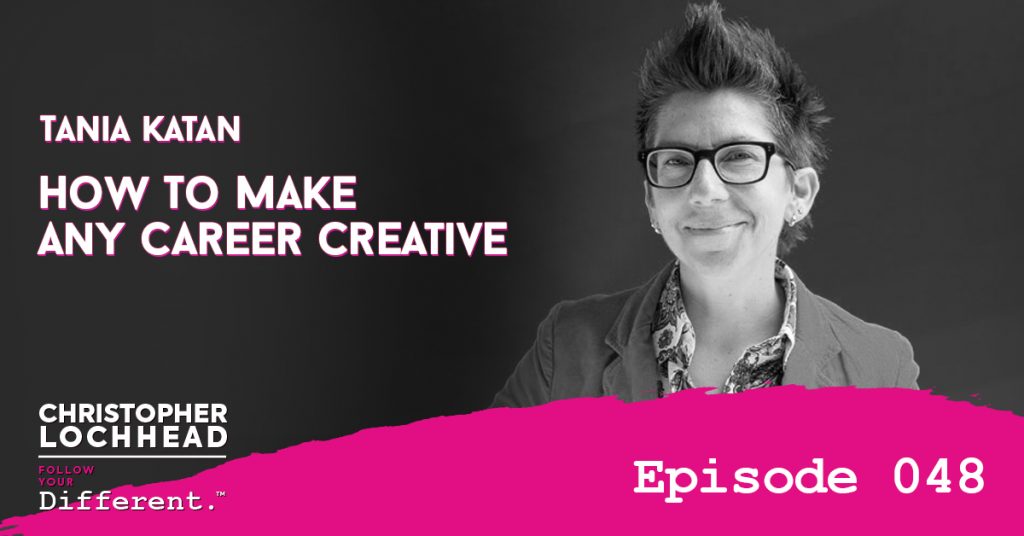
Podcast: Play in new window | Download (Duration: 1:02:32 — 57.5MB) | Embed
Subscribe: Apple Podcasts | Spotify | Pandora | RSS | More
“Every rockstar business needs a punk.” – Tania Katan
On this episode, the incredible Tania Katan has a riveting conversation with Christopher about how to put the spark of joy back into work and life, how she overcame breast cancer and how it shaped her life.
Tania is a powerful example of someone who “used her different” to make her place in the world.
She shares the captivating story of how she went from acting, to working in enterprise technology, to becoming an advocate for women in tech, to becoming a successful author and more.
Tania is famous for starting the empowerment campaign #ItWasNeverADress.
“We don’t need to be in a job or a field that is uniquely creative in order to be uniquely creative within the work we do.” – Tania Katan
Authoring Bestseller “Creative Trespassing”
Tania wrote the book as a dialogue and a monologue.
This reflects the way she holds her book tours and keynote speeches. She lets her audience talk and give her feedback while she listens to them.
Real conversations inspire her.
When she went to record the audiobook, she brought a photograph of her friends, family and other people who inspire her to the studio. This allowed her to feel that she was sharing her stories with them.
Unpacking the Dedication
Tania says that she was born as an outsider.
She wrote about the reality of her life and how she found a way to use “outsiderness” or “misfitness” to create a value for both companies and the people around her.
Her being different is how she makes a difference.
“Embracing the fact that we are misfits and we are flawed allows us to actually take risks and know that the outcome is going to be better than ‘okay’.” – Tania Katan
We Teach When We Most Need to Learn
At the age of 21, her breast was removed to save her life.
Following this event, she felt less—“other”—until she came to a realization when she became an adult.
Nobody is perfect.
Being an outsider can be painful for some people, and this is the epitome of irony. Every human being goes through the same dilemma and we all can feel uncomfortable and scared of becoming misfits.
This is where Tania’s need and desire to speak for them came from—the need to learn herself.
“To be perfect is like to be invisible.” – Tania Katan
By finding a way to harness her different, Tania is the epitome of “why fit in, when you can stand out”.
To hear more about how Tania went from theater to tech industry and how she thinks every rockstar business needs a punk, download and listen to this episode.
Bio:
Tania Katan is an inspirational speaker, creative consultant and co-creator of the #ItWasNeverADress campaign. She is also the best-selling author of the book, Creative Trespassing.
She has been a featured speaker at CiscoLive!, S.H.E. Summit, Business of Software, Expedia, Uber, Etsy, Humana, Google, Amazon, Comedy Central Stage, TEDx, and more.
Links:
We hope you enjoyed Tania Katan on this episode of Follow Your Different™! Christopher loves hearing from his listeners. Feel free to email him, connect on Facebook, Twitter, Instagram and subscribe on iTunes!
047 B2B Enterprise Tech On Fire with Christopher Lochhead
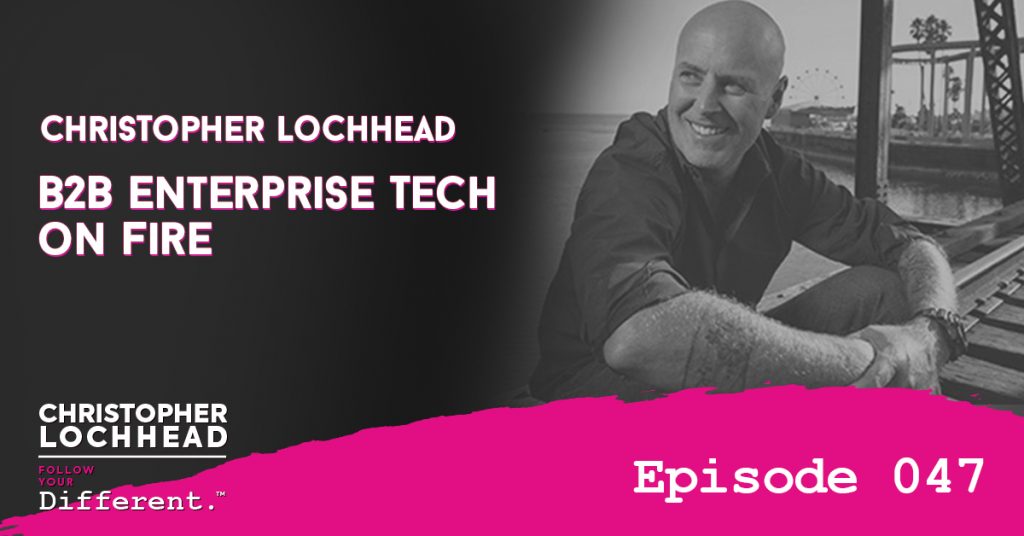
Podcast: Play in new window | Download (Duration: 15:41 — 14.6MB) | Embed
Subscribe: Apple Podcasts | Spotify | Pandora | RSS | More
On this episode, Lochhead shares some of the amazing things going on in the enterprise tech industry.
Enterprise Tech on the Rise
Back in 2012, the legendary venture capitalist Jim Goetz of Sequoia made a declaration that tech entrepreneurs were too focused on the consumer world and have ignored the $500-billion market opportunity, which is the enterprise space. Soon after, the Cloud went bigtime—the tipping point for a lot of big innovations.
Bob Evans of the awesome podcast Cloud Wars said that for Q1 of 2019, Microsoft, Amazon and IBM will combine for $23 billion in Cloud revenue.
“Twice as many enterprise startups have become billion-dollar companies compared to consumer startups.” – Jim Goetz, Senior Partner Sequoia Capital
The Golden Age
Over the last 10 years, there has been an acceleration of innovation. According to Lochhead, this is the greatest time in history to be in the tech industry and particularly in the tech enterprise industry.
“The enterprise space is—if you’re willing to dig it out, if you’re willing to work hard on it and be smart—it’s less binary than the consumer space. With grit, some intelligence, some great technology and some category design, you can really make something of yourself.” – Christopher Lochhead
Enterprise vs Consumer Tech Companies
Rolfe Winkler, the author of the article, The Tech IPO Delivering the Most for Investors, points out that enterprise companies produced a median of 126% stock growth, compared to a median of 15% increase for consumer tech companies.
Consumer tech is a hit business, but it is hard to predict in a way that enterprise tech is not. Christopher also thinks that it’s getting tougher to find new niches in the consumer side and startups are afraid of the big players.
“Consumer-focused businesses may have more cachet, but technology startups that cater to companies are what is really hot.” – Rolfe Winkler, The Wall Street Journal
To hear more about the dynamic enterprise tech industry download and listen to this episode.
Bio:
Christopher Lochhead is a #1 Best Selling Amazon Author and “Top
30” rated Podcaster. He is a former 3 time public company Chief Marketing
Officer in the enterprise technology business where he spent more than 2/3 of
his career. He’s been called “one of the best minds in marketing” by The
Marketing Journal, a “Human Exclamation Point” by Fast Company, a “quasar” by
NBA legend Bill Walton and “Off-putting to some” by The Economist.
He co-authored two best seller
books:
• Niche Down: How To Become Legendary By Being Different
• Play Bigger: How Pirates, Dreamers, and Innovators Create and Dominate Markets.
Links:
Links for Articles and Data Sources:
“As Cloud Market Roars, Microsoft, Amazon and IBM Will Total $23 Billion in Q1 Cloud Revenue”
We hope you enjoyed Christopher Lochhead on this episode of Follow Your Different™! Christopher loves hearing from his listeners. Feel free to email him, connect on Facebook, Twitter, Instagram and subscribe on iTunes!
046 How to Crash Your Career with Isaac Morehouse
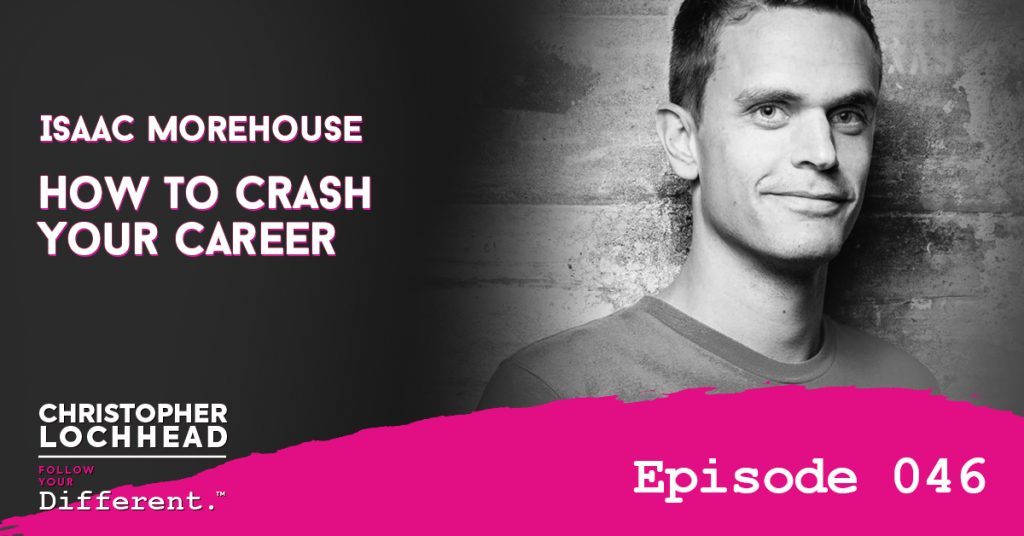
Podcast: Play in new window | Download (Duration: 1:08:15 — 62.7MB) | Embed
Subscribe: Apple Podcasts | Spotify | Pandora | RSS | More
It’s time to get some deeper insights from our guest, we have Isaac Morehouse. In this episode, Isaac and Christopher had a wonderful conversation on how to start or restart your career. They also talked about how to discover the right role for yourself, how to build the right skills to fulfill those roles and how to get the job of your dreams.
Crash Your Career
This is the most condensed version that Isaac came up with to get across the same mindset in a way of thinking about career launch. He is very passionate about helping young people so they don’t get left behind.
The way he processes his ideas is by talking and writing about them that helps him to put his visions of category designs into words.
“If I explain it, then maybe there’s a big chance that I can build it.” – Isaac Morehouse
Career Launch
This is the first step that we need to focus on in order to have a
legendary start. According to Isaac, they are focused on 3 things – discover
some roles, build a profile and tailor a pitch.
If you can do all those 3 things, it will get a lot easier and you can
have an amazing career launch.
“Paper credentials aren’t going to launch your career, you’ve got to be your own credential” – Isaac Morehouse
Unpacking the 3 Things
He compares the idea of, what do you want to be when you grow up to a
funnel. Every step in your life, you should be moving in that funnel and people
are being trapped because of this.
The perfect fit for you is probably something that doesn’t exist yet,
something that you have never heard of or hasn’t been invented yet. The way to
get to it is to start experimenting as you will learn by doing it.
“The only way to know what is a really good fit is to try anything that is not really a bad fit.” – Isaac Morehouse
To hear more about Isaac
Morehouse, founder and CEO of Crash, download and listen to this episode.
Bio:
Isaac Morehouse is the founder and CEO of
Crash, the career launch platform, and the founder of Praxis, a startup
apprenticeship program. He is the author of the wonderful new book called Crash
Your Career. Isaac’s business was focused primarily not exclusively on
younger people in helping them get an amazing start to their career.
Some of his blogs are:
• The Delicate Art of Listening but not Listening
• Life By Subscription
• Music as Programming
Links:
We hope you enjoyed Isaac Morehouse on this episode of Follow Your Different™! Christopher loves hearing from his listeners. Feel free to email him, connect on Facebook, Twitter, Instagram and subscribe on iTunes!
045 Bedtime Stories for Managers with Dr. Henry Mintzberg
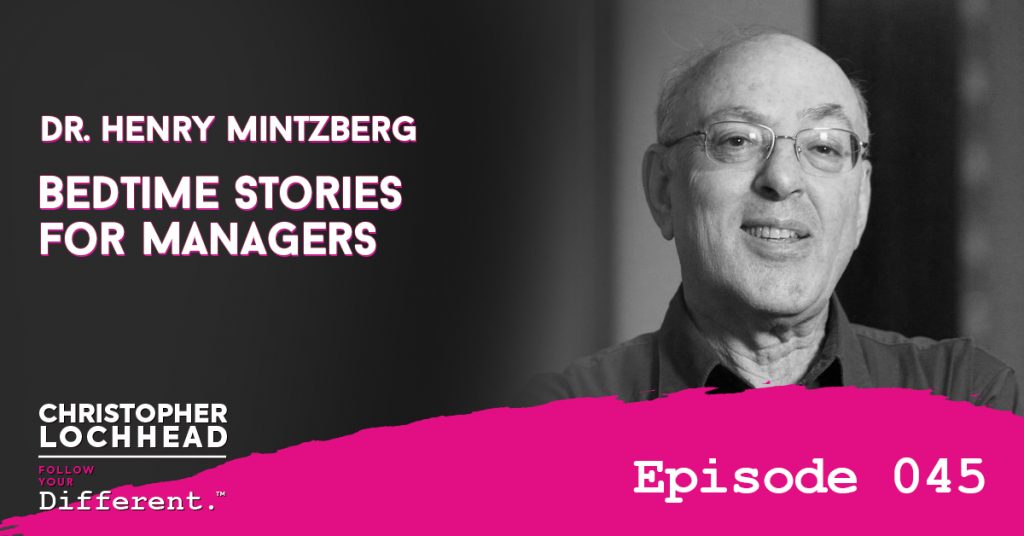
In today’s episode, the awesome Dr. Henry Mintzberg sits with us. He unpacks some powerful,
provocative and counterintuitive approaches to managing and decision making. He
also tells us why he thinks we need less of what he calls, Lofty Leadership.
Bedtime Stories for Managers
Manager is not a word we hear that often. One of the
stories is we can’t separate leadership from management. Good managers lead and
nobody wants a leader who does not manage.
Everyone thinks that they are leadership expert, but for
Dr. Mintzberg, people must practice both together to succeed and enhance a
community.
“Managers are leaders and leaders are managers.” – Dr. Henry Mintzberg
Community vs. Networking
Communities tend to be small as the network can be
massive. He compares these two as the first one can be more personal while
networks are more on relationships and can be critical.
According to Dr. Mintzberg, community is networking. You
keep your community small, but your network of communities is across the whole
organization.
“An effective organization is a community of human beings, not a collection of human resource.” – Dr. Henry Mintzberg
The Epidemic of Managing without a Soul
Have you experienced something where you walk on a certain hotel or restaurant and then 2 minutes later, you can tell if the place is together or not? For sure, some of us can get that feeling and this is what Dr. Mintzberg means when he says there is no feeling in the place.
This has been a theme that would come by entrepreneurs,
CEOs, and people managing businesses. He said that the best way to manage an
organization is by connecting with them.
“Managing is about eating scrambled eggs and live your customers’ experience. Connect with them.” – Dr. Henry Mintzberg
To hear more about Dr. Mintzberg, a Canadian academic and author on business and management, download and listen to this episode
Bio:
Professor Henry
Mintzberg, OC OQ FRSC
is a Canadian academic and author on business and management. He is the
Cleghorn Professor of Management Studies at the Desautels Faculty of Management
of McGill University in Montreal, Quebec, Canada where he has been teaching
since 1968.
Some of his works are:
• Managers Not MBAs
• Strategy Safari
• The Rise and Fall of Strategic Planning
Links:
We hope you enjoyed Dr. Henry Mintzberg on this
episode of Follow Your Different™! Christopher loves hearing from his
listeners. Feel free to email him,
connect on Facebook, Twitter, Instagram and
subscribe on iTunes!
044 Legendary Sales Culture with Dan Casetta
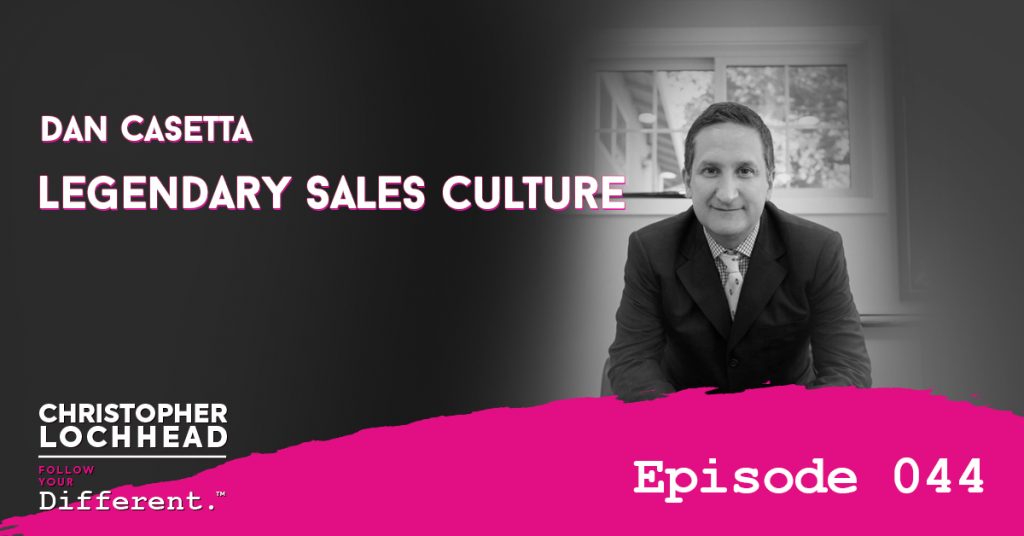
On this episode, we get to hang out with the incredible Dan Casetta. Christopher had a fascinating conversation with Dan about how to build a legendary culture, powerful ideas in recruiting and training, how to lead a young sales teen, how to change limes while saving dimes and a ton more!
Sales Organization
Dan ran the Western part of the Cutco’s sphere that touches the Pacific Ocean with 5,000 salespeople in it. What he loves about this is they get to impact a lot of young people at the time that are critical in their lives.
They get to learn a whole lot of
life skills, knowledge, habits and ways of thinking that make a difference for
them.
“Once you invest time and energy, help them develop and do well, help shape their attitude about the experiences that they have, so that they end up succeeding.” Dan Casetta
Recruitment and
Training
They usually start with the people they know, as in, referrals. It is easier for them to train and develop those people that have been personally recommended. The training is critical and the method of recruiting precedes the training as well.
According to Dan, once the summer is over and school starts, they continue to work with these young people to support their needs. They also have what they call Leadership Academy, where the trainees continue to gain more skills and knowledge that will help them to lead the team.
“We judge people based on attitude, not necessarily based on what part of the town they live in or their background.” – Dan Casetta
Changing Lives
At a very young age, Dan was exposed to the concept of personal development. As he grew up in the business, a large part of the training and development that he did is to help people with their lives.
They teach topics and ideas that are just not related to selling Cutco, but also develop each person in his organization as humans, as people. He created this environment of personal growth in his organization and became successful in this kind of field.
“Help people with their lives, not just their jobs.” – Dan Casetta
To hear more about Dan, a sales leader and business and life coach, download and listen to this episode.
Bio:
Dan Casetta is a record-setting sales manager, business & life coach, national speaker, culture shaping executive and a longtime member of the Cutco. He is also one of the best-selling authors of the book, Success Starts Today with the famous Jack Canfield, author of the “Chicken Soup for the Soul” series.
Some of his blogs are:
• Your Words Matter
• The Magic Secret (Part 1 and 2)
• Decision-Making: Insights to Help You Make Better Choices
• How Much Does It Cost?
• Why Me?
Links:
We hope you enjoyed Dan Casetta on this episode
of Follow Your Different™! Christopher loves hearing from his listeners. Feel
free to email him, connect on Facebook, Twitter, Instagram and
subscribe on iTunes!
043 The Miracle Equation with Hal Elrod
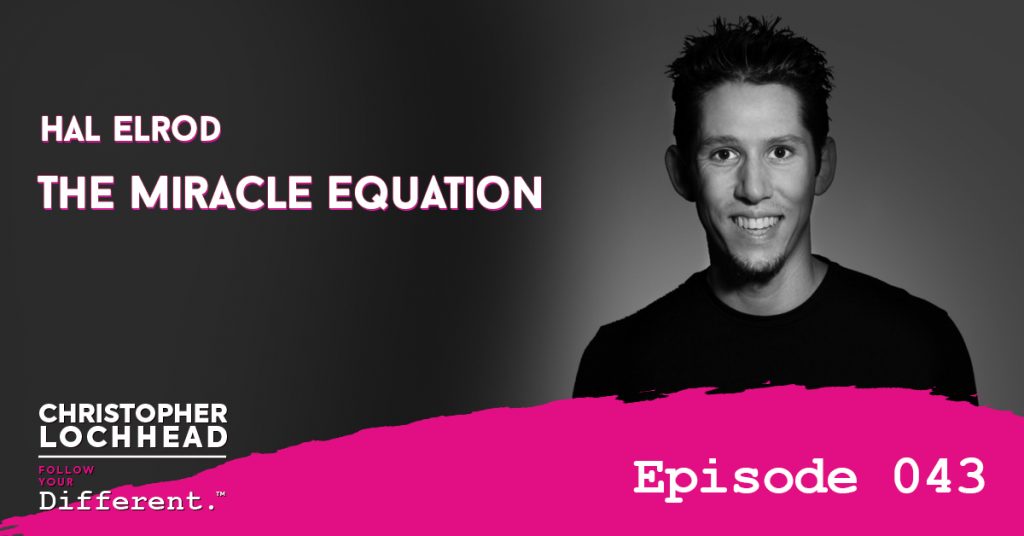
Today, one of the best-selling self-help authors of all time, Hal Elrold sits with us. We unpack his brand new book, The Miracle Equation and talk about his life-changing story after beating cancer. Listen and believe that miracles do happen.
Miracle Equation
Hal created this equation 6 years prior to the Miracle Morning as a concept that he has been practicing and teaching in a company that he worked for. This is the formula that he used to beat cancer.
Anything is possible, but possible is not enough to get us up in the morning. His unwavering faith and extraordinary effort are his biggest decisions that helped him achieve his goal.
“The miracle equation is not a one-time decision to achieve a one-time goal. It’s a fundamental way of living, a way of bringing fate. It is the fundamental lens to which you approach all of your life’s challenges and all of your opportunities, goals and dreams.” – Hal Elrod
Possible to Probable
The voice of self-doubt and fear is what overrides us. According to Hal,
we have to replace fear with faith. Stepping out on faith is how he closed the
gap and by reinforcing that which he called the “Miracle Mantra”.
“You don’t have to believe you can achieve the goal in order to keep moving forward and ensure you achieve the goal.” – Hal Elrod
Unwavering Faith
Developing the quality and characteristics of a
person is what we need to focus on. For as long as there’s effort and by
maintaining unwavering faith, regardless of what the result is, we can achieve
anything.
This is not a one-time decision. It is a fundamental way of approaching our life in every challenge we encounter and in every goal that we set.
“The highest benefit that you can get from setting and pursuing a goal is not to hit the goal. It is who you become on the journey toward the goal by giving it everything you have no matter what.” – Hal Elrod
To hear more about Hal, one of the best-selling self-help authors of all time, download and listen to this episode.
Bio:
Hal Elrod is one of the highest keynote speakers in America,
a top podcaster, and creator of one of the fastest growing and most engaged
online communities in existence. He is also one of the most inspiring authors
of one of the highest rated, best-selling books in the world, The Miracle
Morning.
Some of his works are:
• Achieve Your Goals podcast
• Best Year Ever Blueprint
• (10 books) of The Miracle Morning book series
Links:
We hope you enjoyed Hal Elrod on this episode
of Follow Your Different™! Christopher loves hearing from his listeners. Feel
free to email him, connect on Facebook, Twitter, Instagram and
subscribe on iTunes!

